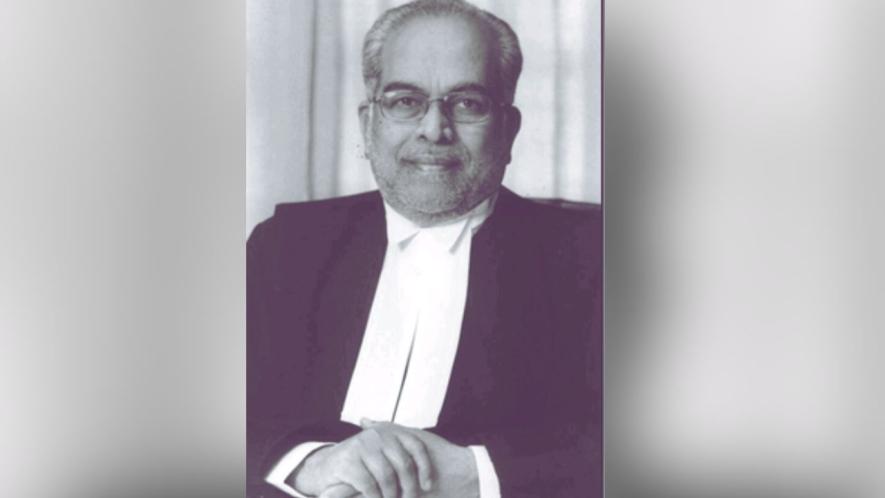Justice Reddy: A Defender of Constitutional Morality

Justice B. Sudarshan Reddy. Image Courtesy: Wikipedia
Justice B. Sudarshan Reddy (Supreme Court Judge: 2007–2011) made a landmark constitutional contribution through the Salwa Judum verdict, where he protected tribal communities and reinforced constitutional norms. His commitment to justice and ethics extended beyond the bench—as a Lokayukta and environmental oversight authority, underscoring his broader legacy in upholding constitutionalism in India, and he tried to strengthen anti-corruption oversight and institutional integrity.
Justice Reddy, who is chosen as the candidate for the Vice President’s post, may not be among the most publicly recognised names from the Supreme Court bench, but his jurisprudence speaks volumes. His decisions reflect a deep constitutional conscience, especially when it came to safeguarding marginalised communities and curbing executive overreach. The Salwa Judum verdict, in particular, remains a cornerstone of Indian constitutional law, where the court reminded the State that counter-insurgency cannot come at the cost of fundamental rights.
The INDIA bloc’s decision is indeed commendable. From every perspective, Justice Reddy is eminently qualified for this constitutional position. In today's politically turbulent environment, nominating a figure like him symbolises a stand for ethics and democratic values. The INDIA bloc's decision reflects their respect for judicial integrity and the dignity of constitutional offices.
Among the pillars of the Indian Constitution, the judiciary holds a critical role. Some judges have etched their names in history through their unwavering integrity, distinctive vision, and faith in democratic principles—Justice Reddy is one among them.
A Student of Law, in Reality
One of the most notable aspects of Justice Reddy’s career is his strong belief in keeping the judiciary free from political influence. His landmark judgments continue to serve as guiding lights for legal professionals. His rulings in cases of national importance have had a profound impact on society.
Born in 1948, Justice Reddy pursued his legal education in Hyderabad and obtained his law degree from the Law College. Even during his student days, he displayed a strong commitment to the legal system, a deep understanding of constitutional values, and a dedication to social justice.
He began his legal career in 1971, advocating on constitutional matters in both the High Courts and the Supreme Court. He gained recognition for his fearless arguments in public interest litigations and constitutional issues.
In 1995, he was appointed a Judge of the Andhra Pradesh High Court, and later in 2007, he took charge as a Judge of the Supreme Court of India. His judgments consistently reflected a reverence for the Constitution, a protection of people's rights, and a firm commitment to transparent governance. He also served as the Chairman of the National Legal Services Authority (NALSA), launching several initiatives to ensure access to justice for ordinary citizens.
Ready to be a Shield for the Powerless
In an era where constitutional values often clash with political expediency, Justice Reddy’s work stands as a quiet but powerful assertion: that the Constitution is not a tool of the powerful, but a shield for the powerless.
In India’s ongoing constitutional journey, few judges have asserted the primacy of fundamental rights with the clarity and courage shown by Justice Reddy. Serving the Supreme Court between 2007 and 2011, his tenure may have been brief, but it left a deep imprint on constitutional jurisprudence.
The 2011 verdict in Nandini Sundar & Ors. v. State of Chhattisgarh, co-authored by Justice Reddy, struck down the controversial Salwa Judum movement—an armed vigilante campaign supported by the state and operated through Special Police Officers (SPOs), many of whom were poorly trained tribal youth.
The judgment held that such a practice amounted to an unconstitutional outsourcing of State violence, violating Articles 14 and 21 of the Constitution. This decision played a vital role in defending citizens' fundamental rights and upholding constitutional values.
Justice Reddy’s opinion was deeply rooted in constitutional morality. It forcefully reminded the State of its obligation under Article 355 to govern in accordance with the Constitution, not through coercive extra-legal means. In his words, arming civilians and exposing them to violent conflict was nothing short of “an abdication of constitutional responsibility.”
This decision not only disbanded the SPO system in Chhattisgarh but also set a normative benchmark: that security policies, no matter how urgent or politically expedient, must operate within the constitutional framework.
Guarding the Line Between Legislature and Judiciary
In the years following the verdict, attempts were made to sidestep the judgment through legislative routes. However, in 2025, the Supreme Court—while upholding the Salwa Judum judgment—ruled that legislating on the same subject, even with modifications, did not automatically amount to contempt, thus reaffirming separation of powers. The jurisprudential line drawn by Justice Reddy thus remained a guidepost for navigating the complex terrain of governance and fundamental rights.
While Salwa Judum was declared unconstitutional, he held that the government's act of arming tribal civilians to fight Maoists was against the Constitution. Pointing out that arming civilians was unethical and risky, he questioned appointing untrained villagers SPOs and giving them weapons. It is a serious violation of fundamental rights. The policy was deemed in violation of Article 14 (Right to Equality) and Article 21 (Right to Life) of the Constitution.
The bench led by Justice Reddy ordered an immediate halt to Salwa Judum activities and withdrawal of arms given to civilians, because the government must ensure citizens' safety, whereas the ruling stressed that the government must address the Maoist problem through legal and secure means, not by turning civilians into combatants.
Through this landmark judgment, Justice Sudarshan Reddy sent a clear and powerful message to the government about the protection of citizens’ rights and defending constitutional values. This verdict stands as a shining example of “judicial humanism” in Indian legal history.
Continuing the Constitutional Mission
Justice Reddy’s commitment to constitutional values did not end with his retirement. In 2022, the Supreme Court entrusted him with overseeing the Comprehensive Environmental Plan for Mining Impact Zones (CEPMIZ) in Karnataka. This role reflected judicial trust in his impartiality and administrative acumen, especially in ensuring that environmental justice and equitable development go hand in hand.
Earlier, in 2013, he was appointed the first Lokayukta of Goa, signaling confidence in his integrity and role in promoting public accountability.
Our Constitution is our own!
Recently, in a public address related to a book titled, Preamble of the Constitution (authored by this writer), Justice Reddy criticised certain senior figures who argue that the Indian Constitution does not truly belong to India. He cited how, even on the day the Constituent Assembly drafted the Constitution, an editorial in the Organizer newspaper openly refused to recognise the tricolour flag and the Constitution.
Justice Reddy, referring to intellectuals, highlighted B.R Ambedkar's response, who proudly stated that if India’s Constitution borrowed from multiple global sources, there was no shame in it. “It is only wise to adopt good ideas, no matter where they come from.”
Wisdom of Nehru and Gandhiji
Quoting Gandhi, “I keep all my windows open to let in fresh ideas from wherever they come,” Justice Reddy remarked how some people try to create artificial conflict between Ambedkar and Gandhi, and then take satisfaction in such misrepresentations.
Idea of Union and Federalism
Before the Constitution’s enactment, Jawaharlal Nehru had drafted the Objectives Resolution, a precursor to the Preamble. He envisioned a Union of States, emphasising greater powers to the States, with only essential powers retained by the Union government. This resolution was introduced on April 30, 1946, even before the Partition Plan.
Justice Reddy questioned critics who belittle Nehru’s contribution, asking whether they even understand his depth of knowledge—evident in his seminal work, The Discovery of India, which explores the Upanishads, the Himalayas, the Ganges, the Aryans, and Mohenjo-Daro. He challenged those who pretend to be learned while unfairly blaming Nehru.
Humanitarian Values in the Judiciary
Justice B. Sudarshan Reddy stands as a symbol of judicial ethics, human rights, and constitutional morality. His nomination to the Vice-President’s office reflects a broader commitment to preserving democratic and humanitarian values in India. His judicial career, particularly the Salwa Judum verdict, is a lasting legacy that exemplifies how law can be a tool for justice and compassion in a democratic society. He reflects humanitarian values in the judiciary.
M Sridhar Acharyulu is Professor of Law, Hyderabad. The views are personal.
Get the latest reports & analysis with people's perspective on Protests, movements & deep analytical videos, discussions of the current affairs in your Telegram app. Subscribe to NewsClick's Telegram channel & get Real-Time updates on stories, as they get published on our website.















